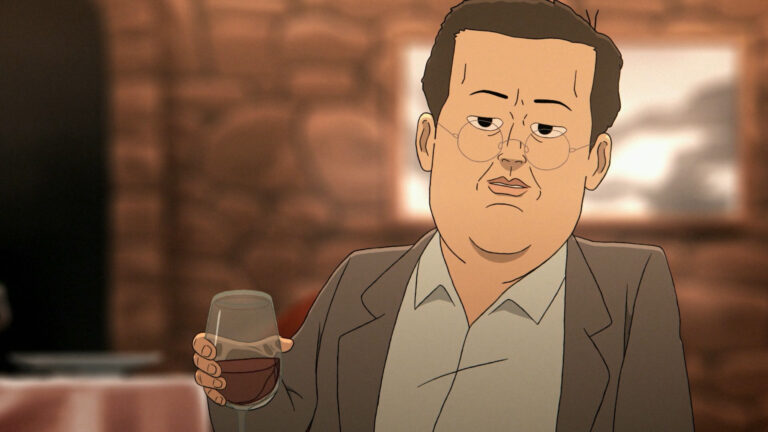Rick Kruger struts onto the screen with a sparkle in his eyes and a Reutical Pharmaceuticals badge so freshly polished it practically blinds. Right off the bat, you know this guy isn’t your average cubicle dweller. No, Kruger is corporate royalty. Or at least, he wears the crown inside his sterile, almost chillingly impersonal office. And yet, his castle of glass and chrome doesn’t shield him from being the absolute punchline of “Common Side Effects”—and a pitch-perfect caricature of everything wrong with Big Pharma.

Let’s peel off the layers, shall we? Because Rick Kruger isn’t just a laughingstock, he’s the funhouse mirror reflecting some of the wildest truths about pharmaceutical leaders today. Thanks to some deep dives and fresh details from fan forums, official commentary, and a few razor-sharp interviews with the creative team, there’s way more to Kruger than meets the tired, over-caffeinated eye.
The Corporate Paint-By-Numbers
First, let’s check the exterior. Kruger’s always in those pinch-you-on-the-wallet suits. His shoes probably cost more than my monthly rent. Everything about him radiates the image of precision — you know, that Silicon Valley-meets-Wall Street vibe. But as soon as the boardroom slides close, his façade crumbles. The guy can barely fake interest in his own company’s major moments. And honestly? That’s where the magic starts.
- He obsesses over farming simulator video games — often during critical discussions.
- He fixates on metrics nobody but he cares about.
- His office sports a soulless aesthetic, more showroom than workspace.
So, while he gives the impression of being laser-focused, he mostly just floats in a bubble of self-importance. It’s improv theater every day, except Kruger’s the only one on the stage who doesn’t realize it’s all a farce.
Parodying Pharma: Satire Served Piping Hot
Now, let’s get to the juicy bit. Kruger could’ve been plucked right out of a boardroom PowerPoint from any Big Pharma scandal in the last decade. “Common Side Effects” uses his clueless confidence as a totally on-the-nose parody of the genre’s greatest hits — think press conferences about miracle drugs that nobody ever actually tested on people, stock surges after empty promises, and executives who blame “workflow adjustments” while lawsuits stack up.
But here’s the twist. Kruger isn’t just funny. He’s scary because, like the best villains, he absolutely believes he’s the hero. The series writers (and Mike Judge, who, let’s be honest, basically engineered this guy from leftover strands of Enron DNA) steeped Kruger with real industry quirks:
- Indifference toward public safety, especially when quarterly earnings are at stake.
- Overbearing charm mixed with a total lack of empathy.
- Wildly off-topic digressions that allow him to dodge responsibility at every turn.
And fans have noticed. Social media threads on commonsideeffects.tv are clogged with people swapping stories about the real pharma bosses Kruger reminds them of. Some even compile meme galleries comparing his quotes to actual corporate testimonies. The lines get blurry.
Judge’s Brilliant Voicework: Eerie and All Too Familiar
Mike Judge knows how to make a snake charming. His deadpan delivery for Rick isn’t just funny — it’s a surgical strike. When Kruger loses the room or doubles down with clueless optimism, you can almost hear echoes of shareholder calls from companies you know have done real-world damage.
Judge, in interviews, has said he channeled “CEOs who always sound like they’re giving a TED Talk to a roomful of toddlers.” Well, mission accomplished. Kruger is chillingly accurate. The line between parody and reality gets thinner every episode, especially when Judge adds those awkward pauses or misplaced bursts of enthusiasm. Even the creators said in a recent roundtable that Kruger’s lines get vetted against actual pharma press releases for “maximum cringe authenticity.” No wonder viewers feel seen.
Season Two: Rick Gets Even Messier
Season one planted the seeds — Kruger as the bumbling figurehead. But then season two cranks up the stakes. Kruger faces his first real public blowback when Reutical fast-tracks “Sparkl,” a wonder drug made from the mysterious Blue Angel mushroom. In boardrooms and product launches, Kruger stonewalls, deflects, and even kind of gaslights everyone with his bluster.
It’s not just clickbait drama, either. These plot lines mimic actual legal fiascos cloaking the industry in recent years. Fans online speculate about each move, trying to figure out which FDA scandal or executive Kruger will parody next. One post on commonsideeffects.tv joked, “Kruger keeps a dartboard of blacked-out New York Times headlines in his office,” and honestly, it feels plausible.
Real-world parallels pile up throughout the second season:
- Kruger approves Sparkl’s rushed release after manipulating clinical trial data.
- Public backlash hits — first as social media mockery, then as Congressional hearings in-show.
- He dodges, pivots, and even blames interns for regulatory shortcuts.
So, the satire isn’t just slapstick. It’s sharper than a boardroom paper cut. The creative team purposely weaves in headlines from actual industry scandals, giving Kruger’s every meltdown a zing of relevance.
Why Rick Kruger Works (and Why He’s Terrifying)
It’s easy to laugh at Kruger’s shallow obsessions, but his character sticks with you for darker reasons. He’s proof that ineptitude at the top doesn’t mean harmless — sometimes it means dangerous, especially when the stakes involve people’s health.
What really turns Kruger into such a multilayered villain, though, is this: beneath the clown mask, there’s a reflection of real power gone unaccounted. While he bungles the day-to-day, he still wields enormous influence. He can tank a stock price with one speech, or — just as easily — oversee products that later make headlines for all the wrong reasons.
So, you laugh, but then you cringe. And as the show digs into its fresh batch of scandals next season (spoilers ahead, but Reddit leaks hint at Kruger possibly testifying before Congress — bring popcorn), it’s obvious he’s not going anywhere. His world keeps spinning, even as the chaos swirls around him.
Fan Buzz and the Meme Machine
Of course, none of this would stick if viewers weren’t obsessed. Scroll any discussion on commonsideeffects.tv, and you’ll see:
- Wild fan theories about which real CEO Rick will parody next.
- Screenshots of his most unhinged rants, captioned with quotes from pharma lawsuits.
- Side-by-side “Kruger vs. Reality” memes that, frankly, are equal parts hilarious and horrifying.
People can’t help but screenshot his most ridiculous business jargon, then compare it with actual CEO quotes ripped straight from pharma history. “Did Kruger really say that, or was that a Pfizer rep?”—a recurring thread asks. Sometimes, users honestly can’t tell. That’s art imitating life with laser precision, folks.
Final Thoughts: The Punchline with Bite
When all’s said and done, Rick Kruger isn’t just there for comic relief. He’s a warning wrapped in a tailored suit and a crooked grin. The show’s creative approach forces you to laugh, but it also dares you to look a bit closer at what happens when real people like Kruger call the shots.
As “Common Side Effects” heads toward more explosive plotlines and, apparently, even darker boardroom debacles, it’s clear: Kruger is both the joke and the warning label. He’s proof that satire can pull double duty — it can crack you up and it can make you uncomfortably aware. And honestly, that’s the kind of villain more shows need.
So, if you find yourself cackling at Kruger’s next boardroom disaster, just remember: sometimes fiction is closer to home than we’d like, and sometimes, the scariest monsters run companies instead of haunted houses. Popcorn optional, but definitely recommended.
And with that, the curtain drops — Kruger’s chaos, for now, is merely on pause.




